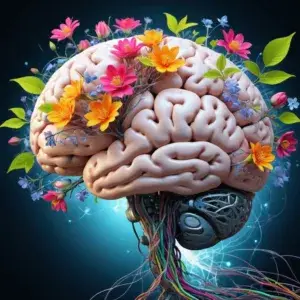Table of Contents
The Importance of Sleep for Mental Health
You might know people who boast about functioning just fine on four hours of sleep. However, numerous studies contradict this sense of bravado, showing significant effects of sleep deprivation on our mental processes. Sleep deprivation isn’t a trivial inconvenience; it’s a prevalent issue, affecting countless individuals in our fast-paced, round-the-clock society.
Understanding sleep cycles is crucial because they hold the key to our mental restoration. During sleep, our brain cycles through stages, including the deeply restorative REM (rapid eye movement) sleep, which plays a critical role in emotional and cognitive functions.
Research offers compelling evidence that lack of sleep is associated with mental health complications. A key study published in the ‘Journal of Clinical Psychiatry’ highlights the link between shortened sleep cycles and heightened risks for depression, anxiety, and impaired cognitive function, shedding light on the gravity of skimping on sleep.
The Cerebral Consequences: Sleep Deprivation’s Toll on Mental Health and Cognitive Function
I can’t emphasize enough how crucial a good night’s sleep is for your mental health and cognitive function. Your brain relies on this downtime to process and consolidate memories. It’s during deep REM sleep that the brain sorts through the day’s experiences, filing away the important parts for long-term storage. So when sleep eludes you, it’s not just your energy levels that suffer; your memory retention does too.
Ever notice how it’s tougher to focus after a bad night’s sleep? There’s a reason for that. Sleep deprivation hampers your brain’s ability to pay attention and stay alert. This means that everyday tasks, especially those requiring sustained concentration or critical thinking, become surprisingly challenging.
Decision-making becomes a herculean effort when you’re sleep-deprived. The brain, already tired from being overworked and under-rested, struggles to assess situations accurately and make calculated choices.
And let’s not forget about creativity and problem-solving skills. These take a hit as well, because a well-rested brain is far better at thinking outside the box and coming up with innovative solutions. Those ‘aha’ moments are harder to come by when you’re running on empty.
Interestingly, some of the most revealing insights come from studies examining professions that demand high cognitive function, like air traffic controllers or surgeons. Mistakes increase and productivity decreases sharply when sleep isn’t in the equation.
So if you’re skimping on sleep and finding it hard to remember where you placed your keys or make seemingly simple decisions, it’s a sign that your cognitive performance is being compromised. As we move to the next section, I’ll shed light on how this state can sink into more serious territory, affecting mood and potentially leading to disorders that have a larger impact on your mental health.
Beyond the Blues: Exploring the Links Between Sleep and Mood Disorders
You might not realize it, but the sleep you’re skipping isn’t just leaving you tired; it’s likely affecting your mood. Consistent lack of sleep is closely tied to the development of mood disorders. It’s like running a machine non-stop without maintenance; soon enough, things begin to go awry.
Rest isn’t just a pause from daily tasks; it’s when your brain processes emotions. Skimping on sleep can make you feel irritable, short-tempered, and even lead to long-term mood disturbances. For people who suffer from sleep deprivation, negative emotions are amplified, and the ability to find joy in the positives can significantly diminish.
Therapists emphasize the importance of sleep for emotional regulation. A well-rested mind can cope with stress better and maintain emotional stability. It’s like having a shield: the better the sleep, the stronger the resilience against emotional upheaval.
The conversation around mood disorders and sleep does not end at prevention or correlation. It extends to treatment. In addressing mood disorders, health care providers often look at sleep patterns as both an indicator and a component of a comprehensive treatment plan.
As the discussion weaves into the importance of sleep for mental well-being, it’s crucial to recognize that it’s not only about quantity but also the quality of sleep. That’s where the next section comes in, offering concrete steps to salvage your sleep and, by extension, safeguard your mental health. The transition to better sleep starts with understanding that achieving it is a skill, and like any skill, it requires practice, commitment, and the right environment. With practical advice, you can begin to set the stage for a good night’s rest.
Nurturing the Night: Strategies for Combating Sleep Deprivation
It’s clear that sleep deprivation can significantly impact our mental health, but I’d like to steer you toward hope rather than despair. Picking up better sleep habits can make a profound difference.
One KEY ACTION is to establish and stick to a consistent sleep schedule, even on weekends. This helps regulate your body’s clock and can aid in falling asleep and staying asleep for the night.
Creating a sleep-inducing bedroom environment is also ESSENTIAL. Keep your bedroom dark, cool, and quiet. Invest in a comfortable mattress and pillows. Consider earplugs, a white noise machine, or blackout curtains if you’re easily disturbed by outside noise and light.
Limit exposure to screens before bedtime. The blue light emitted by your phone, tablet, or computer can mess with your body’s ability to prepare for sleep because it blocks a hormone called melatonin that makes you sleepy.
Care for your body with a pre-sleep routine that could include reading, taking a bath, or relaxation exercises. Avoid heavy meals, caffeine, and alcohol close to bedtime.
If you’re lying in bed unable to sleep, don’t force it. Get up and engage in a quiet, non-stimulating activity until you feel sleepy.
Recognize when you’re stuck. If sleep deprivation continues to interfere with your daily life despite changing your habits, seek guidance from a healthcare provider. Chronic sleep issues may signal sleep disorders or other health conditions that require professional treatment.
Remember, improving sleep is a journey toward better mental health, and small, CONSISTENT steps forward can have a significant impact.
The effects of sleep deprivation on mental health are real, and involve a reduction in cognitive function, lack of ability to make effective decisions, a loss of focus and attention, and a reduction in creativity. You really owe it to yourself and your brain to optimise your sleep routine and make sure you are not suffering the short term and long term effects of chronic sleep deprivation.
Resources
- “Sleep and Mental Health: An Overview”
Harvard Medical School
Link - “The Impact of Sleep Deprivation on Mood and Cognitive Performance”
Nature Reviews Neuroscience, 2017
Link - “Chronic Sleep Deprivation and Depression: Mechanisms of Interaction”
Journal of Clinical Psychiatry, 2015
Link - “Sleep Deprivation and Anxiety: The Link and How to Break It”
Sleep Medicine Reviews, 2016
Link - “The Neurocognitive Effects of Sleep Deprivation on the Brain”
Journal of Neuroscience, 2018
Link





